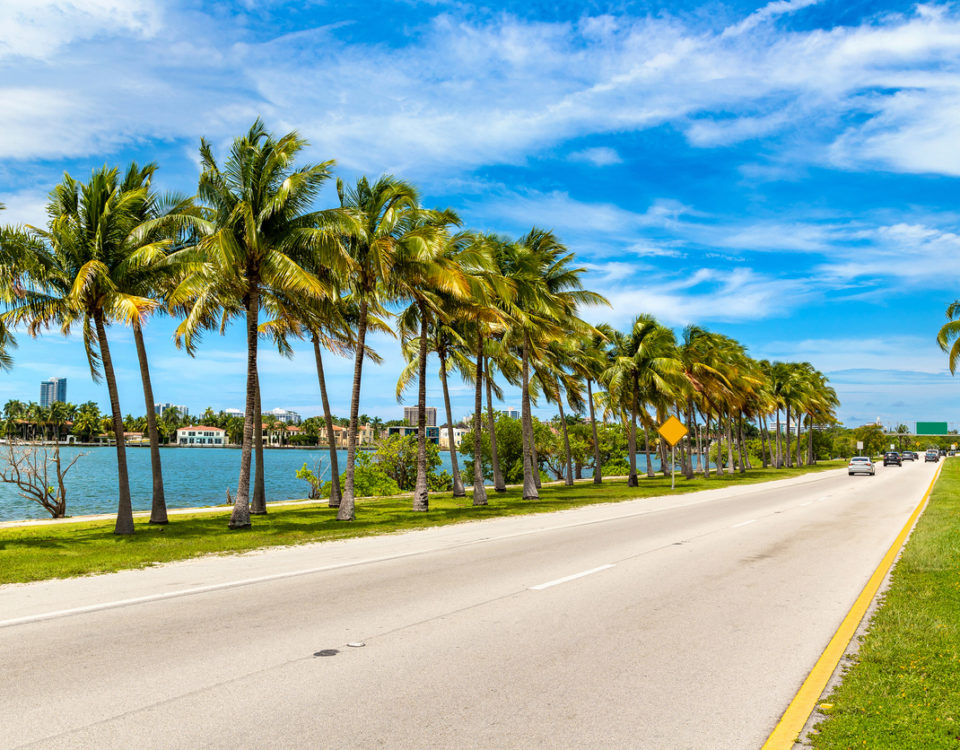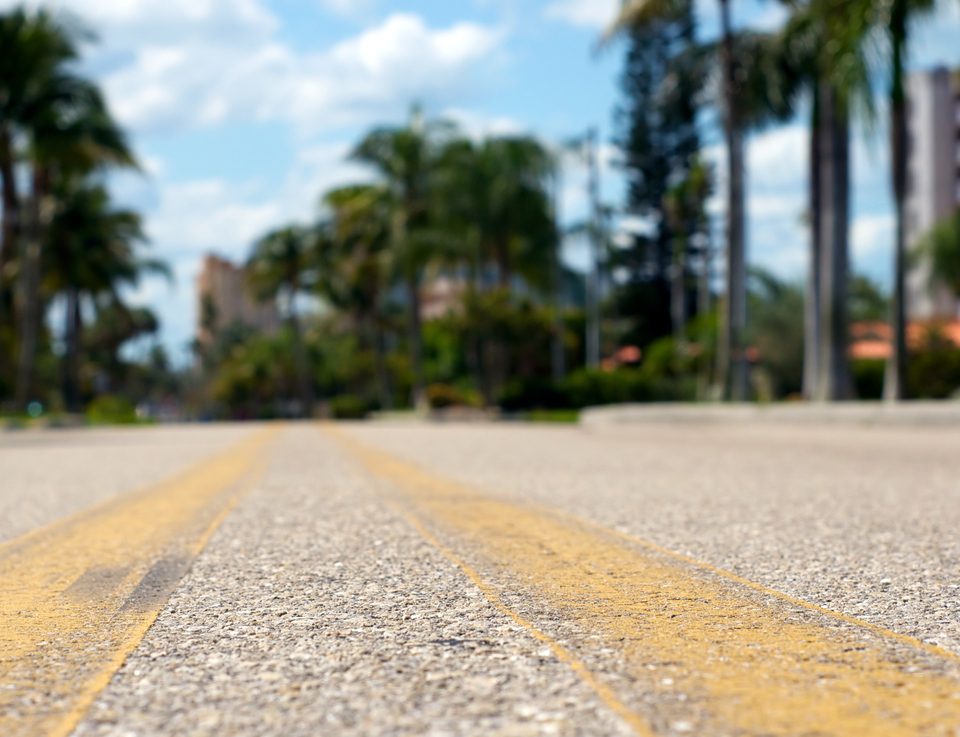Road Trips in Florida: What You Need to Know

Most Dangerous Roads for Bicyclists in Florida
August 11, 2022
5 Things to Know If You Have a Rental Car Accident in Florida
September 8, 2022Florida is the second-most visited state in the nation. In 2021 alone, over 122 million people visited Florida, a total still well below pre-pandemic tourism levels. The visitor numbers for the first quarter of 2022 suggest Florida will meet or exceed the pre-pandemic numbers this year.
About one-third of tourists arrive in Florida by air, while two-thirds arrive by other forms of transportation, including cruise ships, trains, and cars. Those who do not arrive by car often rent cars to travel around the state.
Things to Know Before Your Florida Road Trip
Florida has many unusual and even unique things that can affect your next road trip. From planning strategies to written and unwritten rules of the road, there are several key things to know before you hit the road in Florida:
Florida’s Welcome Centers Offer Free Orange Juice
Travelers who arrive in Florida by car often travel along I-10, I-75, and I-95. Florida operates official welcome centers on these freeways located near:
- Pensacola on I-10
- Lake City on I-75
- Yulee on I-95
These welcome centers have clean bathrooms for travelers. You will also find bookcases full of magazines, brochures, and maps for many of the attractions in Florida. Complimentary copies of the Florida Official Transportation Maps and the Visit Florida Magazine are also available.
Courtesy of the Florida Citrus Commission, Florida’s welcome centers even give away free cups of orange juice and grapefruit juice. This industry group promotes the citrus growers who employ over 33,000 workers in Florida and generate over $6.75 billion in revenue.
Florida Has a Lot of Rental Cars and Still Experiences Shortages
Typically, Florida’s major airports in Orlando, Miami, Fort Lauderdale, Tampa, and Jacksonville provide generous fleets of cars for travelers. However, rental car companies have recently experienced rental car shortages due to supply chain issues.
During the COVID-19 pandemic, rental car companies sold their fleets because they were sitting unused. But when people started traveling again, the companies had difficulty replacing the cars they sold. Auto manufacturers could not produce cars at the same rate as before the pandemic due to a microchip shortage.
If you plan to arrive in Florida by ship, train, or airplane and rent a car for your road trip, you should be aware that:
- Rental companies might not have vehicles available without a reservation
- Reservations might get canceled if the rental company runs out of cars
- You may receive a different class or style than the car you reserved
- Your rental car will probably cost a lot more now than it did before the pandemic
To give yourself the best chance at the vehicle you want for your road trip, make a reservation well in advance. A last-minute reservation can be much more expensive, and you may risk not getting a reservation at all on short notice.
You can also try reserving a vehicle from a neighborhood away from the airport, cruise terminal, or train station. These neighborhood locations usually have limited hours. But since they are away from arrival ports, you have less competition when renting a vehicle.
Florida Traffic Congestion Can Get Bad
Tourists combine with locals to clog many of the roads near Florida’s most visited areas. The Urban Mobility Report calculates congestion numbers across the country every year. The 2021 report was skewed due to the pandemic lockdowns in 2020.
But pre-pandemic, reports showed that drivers expecting a 20-minute trip in Florida cities would face these travel times due to congestion:
- 41 minutes in Miami
- 37 minutes in Tampa
- 33 minutes in Orlando
- 33 minutes in Jacksonville
And these delays were not limited to large cities. Smaller and mid-sized cities like Kissimmee, Sarasota, and Coral Gables also routinely saw delays of 6 to 17 minutes for a 20-minute trip.
Florida Has Toll Roads
Florida uses toll roads to combat traffic congestion and pay for the state’s transportation infrastructure. These toll roads include many of the highways that road-trippers use to reach the major cities and tourist attractions in Florida, such as:
- The Florida Turnpike connecting Orlando and Miami
- The Beachline East Expressway connecting Orlando and Port Canaveral
- The Beachline West Expressway connecting Orlando International Airport to the Orlando resort areas
Florida also has toll bridges heading to Miami Beach and crossing bays in Tampa, Pensacola, and Destin.
You can pay the tolls for roads and bridges two ways. For example, the toll authority can use cameras to capture your license plate and mail a toll bill to you.
Alternatively, you can purchase a SunPass transponder in Florida to pay discounted tolls. If you travel to Florida from an East coast or Midwest state that uses EZ Pass or iPass, your transponder will work on Florida’s roads and bridges.
Florida Gets a Lot of Rain
Driving in Florida requires care. The biggest surprise for many out-of-state drivers is how much rain Florida gets. Florida receives 40 to 60 inches of rain every year.
Not only that, but you can expect about 118 rainy days per year in Florida. If you travel during the summer months, more than half the days in June, July, and August will usually receive rain.
Florida Uses No-Fault Insurance
Florida uses a no-fault insurance system, which means that the driver’s insurance covers basic medical expenses and wage losses, regardless of who caused the accident.
After a car accident in Florida, residents file a claim with their own insurance policies instead of the at-fault driver’s policy. If their no-fault policy does not cover all their expenses, or if they suffer a significant permanent injury, Florida residents can seek compensation from the at-fault driver.
As an out-of-state driver, you do not need to carry no-fault insurance. But you do need to carry liability insurance. Liability insurance will pay for injuries you cause that were not covered by the injured person’s no-fault insurance.
Planning Before a Road Trip in Florida
You should not need much planning before traveling to Florida. Florida has similar traffic laws to most other states. And its seat belt and car seat requirements are just like those of other states.
However, it is important to slow down, avoid distractions, and drive carefully during rain storms while traveling in Florida. Staying safe on the road will make your trip to Florida both easier and more enjoyable.
You may also be interested in:




